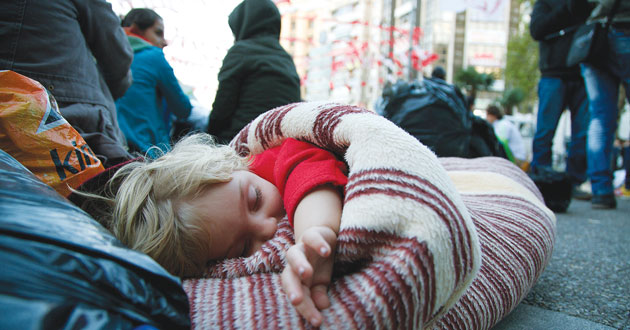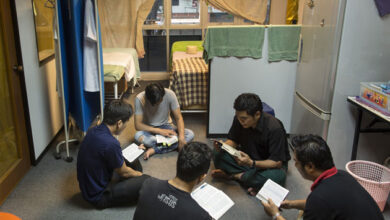Refugee highway | Christians minister to thousands traversing Europe

LONDON — While the European Union grapples with the complexities of handling hundreds of thousands of refugees and migrants streaming across its borders, Christians throughout the region see this as an unprecedented opportunity for outreach and ministry among those fleeing war, persecution and economic hard times.
“This ever-expanding crisis might just be the opportunity of our generation for Gospel advance among some of the least reached peoples on the planet,” said James Keath,* senior International Mission Board strategy leader for Northern Africa and the Middle East. “I believe God is working through the events of our day to move these least reached peoples into arm’s reach of the church so that they can encounter Christ.”
Mark Edworthy, Keath’s counterpart for Europe, noted, “The continent of Europe is radically changing, and we have an unprecedented open door to impact the newest arrivals with the Gospel,” he said.
The path across Europe varies, but the starting and ending points seem to be the same. Most refugees, asylum seekers and migrants make their way to Greece and ultimately end up in Germany. They come from the Middle East, Northern Africa, Central Asia and even as far away as East Asia.
According to the U.N. refugee agency, Greece has received more than half a million “sea arrivals” so far this year, while the total number of refugees arriving in Europe by way of the Mediterranean now approaches 650,000. German vice chancellor Sigmar Gabriel has said his country could be hosting up to one million refugees by the end of the year.
From Greece, the “refugee highway” formerly traversed countries of eastern and central Europe. Now, because of a spate of border closures, the highway crosses through the Balkan states, including Macedonia, Serbia, Croatia and Slovenia. Refugees then make their way into Germany.
Nearly 250,000 refugees passed through the Balkans since mid-September, according to the EU, with many fleeing conflict in Syria, Iraq and Afghanistan.
“The Lord has abruptly brought tens of thousands of refugees through ministry points in Greece, Hungary, Germany and many other countries,” Edworthy said. “Our workers have partnered in the immediate response work in Greece, as well as the follow-up and settlement work in Germany. As refugees distance themselves from the strictures of an anti-Christian culture and see Christian love tangibly shown, they naturally ask about motivation and ultimately about hope,” he said.
Thousands of Bibles have been distributed to those spreading across the European continent, Edworthy said. “We have seen countless of these transients find hope,” he said.
Housing tops the EU’s concerns for refugees, said Jean-Claude Junker, president of the EU’s special commission on the refugee crisis. “It cannot be that in the Europe of 2015 people are left to fend for themselves, sleeping in the fields,” he said. The proper registration of transient peoples is also of major importance to the EU.
Abraham Shepherd, who works in the region, said, “Beyond the numbers, beyond the registered, beyond the journey that these people suffer and endure, these numbers represent people.”
He noted, “I remember standing at that border with Macedonia with my wife, and we noticed hundreds of people lining up for some little food and some clothing in a very harsh environment — flimsy tents — plastic with plastic tarp on the floor. We noticed a well-dressed woman with her daughter, and they were in tears, just broken to pieces. They were scared.”
Shepherd said sometimes all it takes is a smile from a friendly face or a few words of encouragement to make the journey a little more bearable for a refugee. If just that is done when ministering to refugees, it would be a big help, he said. He encourages Christians in both Europe and North America to send teams to Europe’s refugee highway, to have a Christian presence there and bring hope to those making the traumatic journey.
Every refugee has a story, Keath said.
“In the reports I get from teams working among refugees, I repeatedly hear the same two things,” he said. “First, every refugee has a story of despair from the unspeakable horrors they have experienced. This just breaks your heart. And if it weren’t coupled with a story of hope it would probably break your spirit.”
Keath said that hope is the story. “Everywhere we encounter refugees we are seeing not just incredible opportunity for a clear, bold expression of the Gospel; we are also seeing hearts that are wide open and searching for that hope in Christ,” he said.
Shepherd noted, “Sometimes God allows persecution — He knocks things out of control. Maybe those are the things that make people soften their heart and their spirit and their being toward a mighty God who created them. When we’re busy, when we’re strong, when we have it all, thinking we’re in control, we don’t have that need to question or search what is the meaning of life.”
Now is the time to reach the hearts and minds of the refugees streaming across Europe, Shepherd said. “In the urgency of the situation we should engage them as they are seeking, engage them as they have crisis of identity, engage them as they are bewildered about their beliefs and what kind of belief they should be embracing,” he said.
António Guterres, U.N. High Commissioner for Refugees, said, “For the vast majority of uprooted people, there are few things as powerful as their faith in helping them cope with fear, loss, separation and destitution.
“Faith is also central to hope and resilience,” he said. “In most circumstances local religious communities are the first which our people of concern turn to for protection, assistance and counseling. Faith-based organizations often enjoy higher levels of trust from the community, better access and broader local knowledge, all of which are important assets in program design and delivery, including in complex and insecure environments.”
Don Alan,* a Christian worker in the Middle East serving among Syrian refugees, said, “Let’s be honest. Whether we talk about a thousand or ten thousand or a hundred thousand, the problem is much bigger than any one of us. It calls for the body of Christ to step into the gap, extend a cup of water, a home, a job and the hope that resides in us, the saving power of our Lord Jesus Christ.”
He said there is a call for unity among the body of Christ to respond with His voice, His love and His actions, doing so as the author of Hebrews said: “We are not of those who shrink back … but of those who have faith,” (Hebrews 10:39, NASB).
“I pray that we would not shrink back from the opportunity to be salt and light, to be the hands of Jesus to the marginalized and forgotten,” Alan said. “I am so thankful for those stepping up and coming alongside of us at this critical juncture in the lives of many of these refugees.”
Keath said, “Recognizing this as a historic opportunity is one thing. Stewarding that opportunity is another thing. How will we as the church respond?”
— by Charles Braddix | BP




